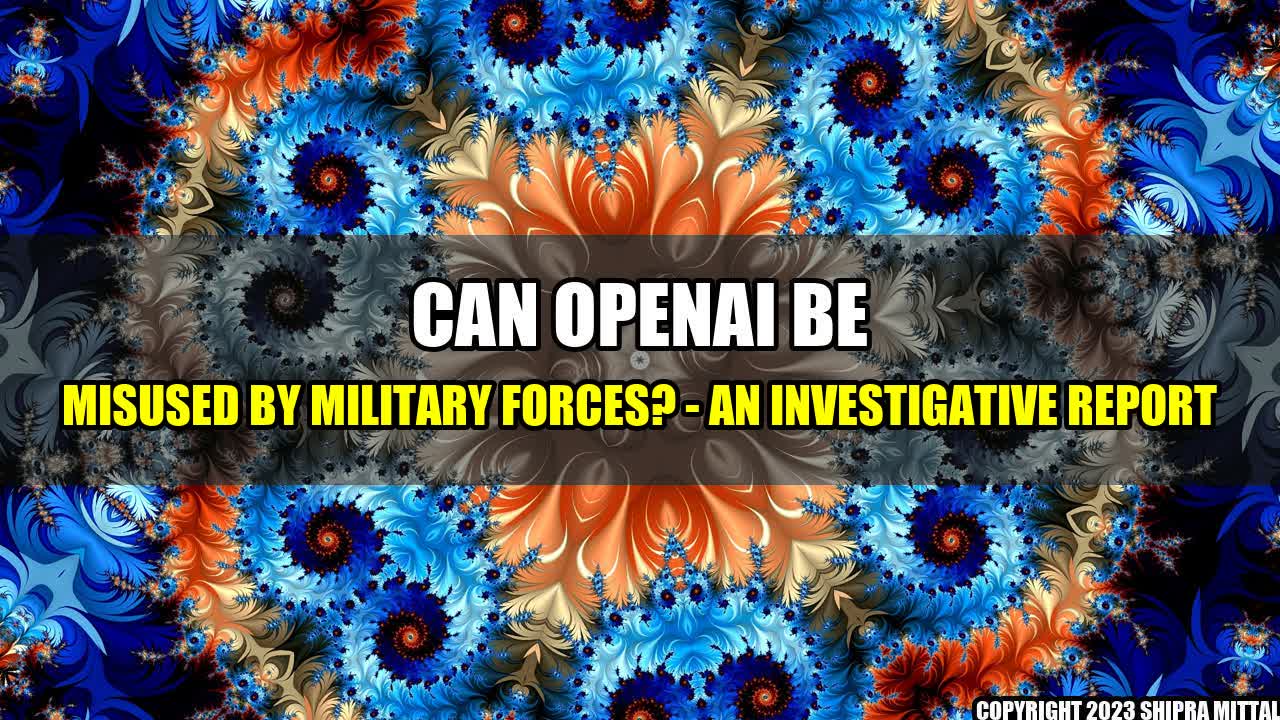Can OpenAI be Misused by Military Forces? - An Investigative Report

It was a routine day at the Pentagon when Lt. Col. Smith received an urgent call from the General's office. He was asked to come immediately as they had to discuss an important matter. Nervously, he made his way to the General's office.
As soon as he entered, he saw a group of people huddled around a computer screen. "Colonel, have a look at this," the General said as he motioned Smith to come closer. On the screen was a conversational chatbot, powered by OpenAI technology, that could answer questions with remarkable accuracy and speed.
The General explained to Smith how this technology could be used to gather valuable intelligence and improve communication with troops in the field. Smith was hesitant. He knew that OpenAI had been developed for peaceful purposes and using it for military applications could have unintended consequences.
The use of OpenAI technology by military forces raises serious ethical concerns. While it has the potential to improve efficiency, accuracy, and safety, it also poses great risks and controversies. Let's take a closer look at some real-life examples:
The Controversy Surrounding Project Maven
In 2018, Google's involvement in Project Maven, a military initiative that used AI to analyze drone footage, sparked outrage among its employees and the public. Thousands of Google employees signed a letter requesting the company to stop developing technology for warfare. Eventually, Google decided not to renew its contract with the Pentagon.
Further Reading: Google Workers Protest Company's Role in Pentagon AI Project
The Use of AI-Powered Chatbots in Warfare
Chatbots powered by AI technology have the potential to revolutionize the way military forces operate. They can assist in intelligence gathering, logistics, and communications. However, they can also raise concerns about accountability and ethical considerations.
Real-Life Example: The U.S. Army is currently using an AI-powered chatbot called Sgt. Star to help recruits with their questions and concerns. However, critics have raised concerns about the use of chatbots in military recruitment, arguing that they could be programmed to mislead or manipulate potential recruits.
Further Reading: US Army Rolls Out AI-Powered Sgt. Star Chatbot for Future Troops
The Risks of Autonomous Weapons
Autonomous weapons, or killer robots, are weapons systems that can independently identify and attack targets without human intervention. While they are not yet fully operational, the development of these weapons raises serious concerns about accountability, safety, and ethics.
Real-Life Example: In 2015, over 1,000 AI researchers signed an open letter calling for a ban on autonomous weapons. The letter warned that the development of these weapons would pose a significant risk to human life and security.
Further Reading: Autonomous Weapons: An Open Letter from AI & Robotics Researchers
Summary:
- The use of OpenAI technology by military forces raises serious ethical concerns.
- Real-life examples highlight the potential risks and controversies of OpenAI in military applications.
- The development of autonomous weapons, or killer robots, poses significant risks to human life and security.
In conclusion, the use of OpenAI in military applications is a complex and controversial issue that requires careful consideration of ethics, accountability, and safety. As technology continues to evolve, it is essential to have open and transparent discussions about its potential benefits and risks.
Reference URLs:
- The Intercept: Can the Pentagon Use ChatGPT OpenAI? Won't Answer
- Autonomous Weapons: An Open Letter from AI & Robotics Researchers
- Google Workers Protest Company's Role in Pentagon AI Project
- US Army Rolls Out AI-Powered Sgt. Star Chatbot for Future Troops
Hashtags: #OpenAI #Military #Ethics #ArtificialIntelligence #Chatbots #AutonomousWeapons
Akash Mittal Tech Article
Share on Twitter Share on LinkedIn